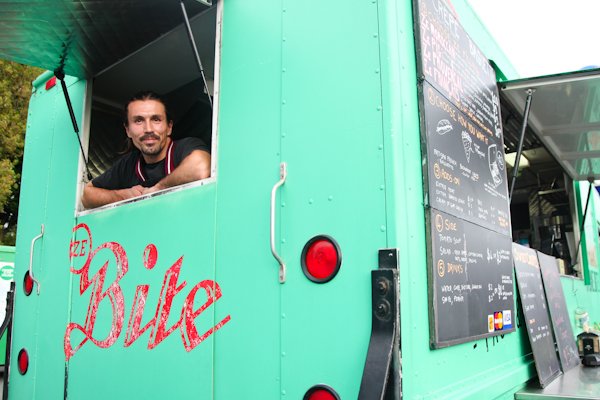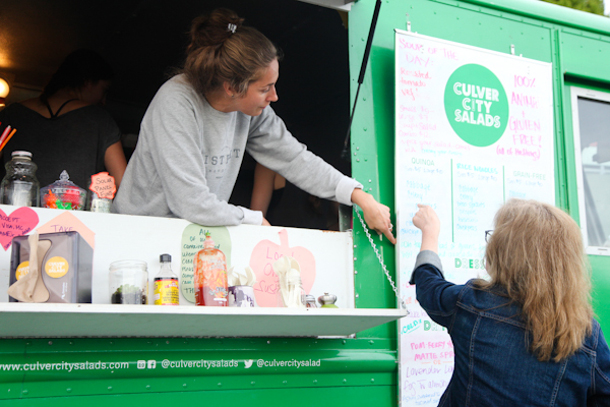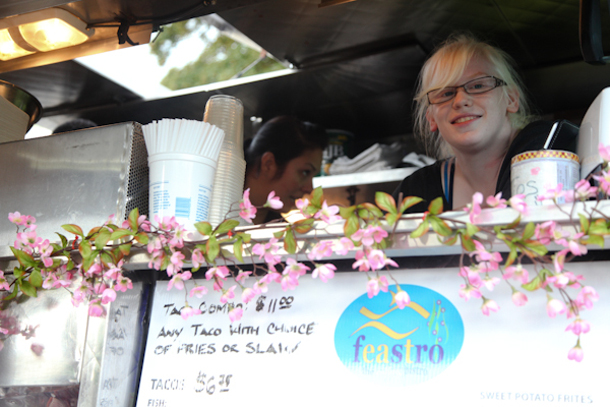"Look around," invites Mathieu Gicquel as we climb aboard his ZeBite food truck. Two crêpes sizzle on their own grills, topped with braised pork and apple slices, as customers pass their cash hungrily up from the ground below. It's cool and overcast outside, but in here, sweltering. "You see, it's a real kitchen -- it could be even bigger than some restaurants," he says.
Now three years old, ZeBite is among Vancouver's 100 food trucks, carts, and vendors -- and one of 33 that make up the StreetFood Vancouver Society, a non-profit association that describes its members as "premier food carts and trucks," which offer high-quality, unique dishes and use sustainable practices.
With a dizzying array of options, it's clear Vancouver food carts are a mainstay. But with the industry reliant on a constant supply of take-out containers, gas generators and the fuel required to cover significant driving distances, the next challenge for carts serving the so-called greenest city is to reduce their environmental impact.
Some of the society and its members' efforts to go green will be on display at Food Cart Fest this summer, which runs every Sunday afternoon in Vancouver and -- for its inaugural season -- every Saturday afternoon in Surrey, starting August.
Carting out waste
With ZeBite, Gicquel serves up French-inspired items with names like "Ze Pig" and "Ze Provencal" made with organic flour and locally-sourced meats that are free range and free of antibiotics and hormones.
The former engineer decided to change course and fulfill a long-held dream of entering the restaurant business. With food carts taking off in Vancouver three years ago, Gicquel saw his chance. "What's been the most challenging has been to make it financially viable," he says, "and to understand what [people] are expecting from a food truck."
Starting up any food establishment isn't easy, and it's well-known that many independently-owned restaurants don't survive their first few seasons. Vancouver's scene, however, appears to be thriving, due in part to hype around events like Food Cart Fest and the surging popularity of food trucks in general. Though business can still be tough, many operators say they're ready to reduce waste, even if it means increasing their costs. After all, they say, it's what their customers want.
ZeBite and other food carts have been encouraged in their environmental efforts by Vancity Savings Credit Union, of which Gicquel's business is a member. Vancity estimates that roughly 20 per cent of the city's food carts and trucks are members of the financial institution, and it's offering them support to help transition towards more sustainable practices, including cutting down on wasteful packaging and purchasing from local producers. A number of its member carts have received small loans to help kickstart their businesses, and the credit union is in a "multi-year partnership" with the festival that brings them together.
Vancity is also supporting the festival's efforts to reduce the waste it generates. It's bringing in another partner, Recycling Alternative, and dozens of volunteers from Green Chair Recycling to help (and teach) the public how to sort compostables from recycling and landfill garbage. The goal is a "zero-waste event," says William Azaroff, Vancity's community business and development director.
Evolving a system
"Events like this can be incredibly wasteful," admits Azaroff. Plates, drinks, spoons -- "all that usually goes into the landfill."
How to make the Food Cart Fest more sustainable is a challenge for planner Danny Fazio, who recently co-launched the Fox Cabaret on Vancouver's Main Street and runs the fest-organizing Arrival Agency.

Three years ago today the first festival took place in the backyard of the Waldorf Hotel, where Fazio used to run events. The festival moved the following year to a vacant lot near Olympic Village. Early on, Fazio admits, some customers complained about the amount of container garbage produced at the event.
"At the Waldorf, we didn't do a lot of outdoor events," he says. "Managing the waste was a struggle, because we didn't really understand it."
As the festival evolved, he says, organizers put better systems in place and the complaints ended. This year, with helpful waste-sorting instructions from volunteers, Fazio is confident the event will make the zero-waste target.
One truck goes solar
Some trucks are going beyond waste reduction and local food. Last Friday, another popular food truck, Culver City Salads, hit its own eco-target -- announcing it had successfully fundraised $20,000 to replace its gas generator with costly solar panels, high-efficiency fridges and clean batteries.
Cart owner Christina Culver says she always wanted to "work within the community as much as possible," including composting everything, using biodegradable containers, and scaling back waste. But to operate a food truck and power up its health inspector-required refrigeration, a gas-guzzling generator is simply a must.
"We don't feel that using a generator fits within the mantra of our business and the sustainability that we're after," Culver said in a video released as part of the fundraiser. "So the only way that we can manage this, from all the research that we've done, is to get solar panels on the truck."
It's not cheap. Culver City Salads is budgeting $9,000 to buy solar panels, $6,000 for new energy-efficient fridges -- a prototype newly-released into the market, Culver says -- $3,000 for clean batteries, and $1,200 for their green retrofit.

What about increasing the use of local ingredients? For premium trucks like ZeBite, that's a no-brainer. Owner Gicquel insists it's not about catchphrases or food security theories. "I just believe in quality food."
Gicquel believes it's possible for food trucks to embrace sustainability, whole hog. "It is feasible today to use compostable, biodegradable containers and so on. And using local food is very feasible as well -- our meats are local, from Abbotsford and Maple Ridge."
Vancity's Azaroff said that supporting local, organic producers has been a "big focus" of the bank for several years. As of last year, all StreetFood members featured at least one locally sourced ingredient in their dishes.
"We're still at point where it's hard to put together an entire dish locally, but each of them has at least one item, and many have multiple local ingredients that come from this region," he says.
Come hungry
But with our economy still pricing locally-grown organic food highly, and the increased costs associated with compostable packaging -- let alone the thousands required to install renewable energy sources -- Azaroff suggests that a cooperative approach like StreetFood's could go even further. Particularly when customers want their street food to be affordable.
"It's about building a cooperative network," he says. "That's what has to happen to give assurance to local growers and to make it sustainable, rather than a bunch of one-offs."
An $18 grilled cheese sandwich isn't realistic, he says. "What's the balance of moving towards local ingredients but keeping the price point reasonable for people to purchase? Can they buy in bulk? That's a role the [StreetFood Society] could play, and that we'd be really happy to support."
This year, the Food Cart Fest Vancouver will roll out 3,000-square-feet of recycled football stadium astroturf, in hopes that fest-goers will sit and share their food cart feasts together. On top of bringing back an eclectic DJ from previous years, the festival will also feature ping pong tables and a demonstration urban garden.
For Fazio, the fest is about creating a sense of exploration and connection between people and their city.
"To boil it down, it's great food, summer in the city, and community," he says. But his most important message for fest-goers is much simpler: "Come hungry!"
Vancouver Food Cart Fest runs every Sunday from noon to 5 p.m. until Aug. 31, at 215 West 1st Ave.
Starting August 2, the inaugural Surrey Food Cart Fest runs every Saturday from noon to 5 p.m. at Surrey's Civic Plaza on 103rd Avenue.
Entry for both is $2, free admission for Vancity and car2go members, or those who bring a non-perishable food bank donation. ![]()
Read more: Food, Environment
This article is part of a Tyee Presents initiative. Tyee Presents is the special sponsored content section within The Tyee where we highlight contests, events and other initiatives that are either put on by us or by our select partners. The Tyee does not and cannot vouch for or endorse products advertised on The Tyee. We choose our partners carefully and consciously, to fit with The Tyee’s reputation as B.C.’s Home for News, Culture and Solutions. Learn more about Tyee Presents here.
















Tyee Commenting Guidelines
Comments that violate guidelines risk being deleted, and violations may result in a temporary or permanent user ban. Maintain the spirit of good conversation to stay in the discussion.
*Please note The Tyee is not a forum for spreading misinformation about COVID-19, denying its existence or minimizing its risk to public health.
Do:
Do not: